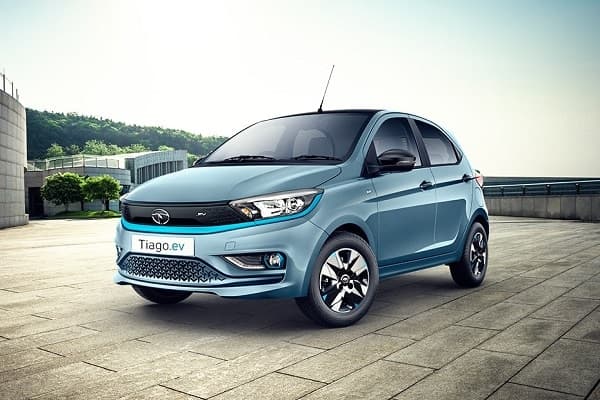Tata Tiago EV
Tata Tiago EV is a 5 Seater seater car, Ex-showroom price starting from Rs. 7,99,000 in India. It is available in 7 variants, and 1 transmission option: Automatic .| Battery Capacity | 19.2-24 kWh |
| Max Speed | 120 Kmph |
| Range | 250 - 315 km |
| Charging Time | 3.6 Hrs |
Tata Tiago EV price starts at ₹ 7.99 Lakhs and goes up to ₹ 11.89 Lakhs (Ex-showroom). Tata Tiago EV comes in 7 variants. Tata Tiago EV's top variant is XZ Plus Tech LUX Long Range Fast Charger.
₹7.99 Lakhs* | 19.2 Kwh 250 Km |
₹8.99 Lakhs* | 19.2 Kwh 250 Km |
₹9.99 Lakhs* | 24 Kwh 315 Km |
₹10.89 Lakhs* | 24 Kwh 315 Km |
₹11.39 Lakhs* | 24 Kwh 315 Km |
₹11.39 Lakhs* | 24 Kwh 315 Km |
₹11.89 Lakhs* | 24 Kwh 315 Km |
Tata Tiago EV Specifications and Features
| Battery Capacity | 19.2-24 kWh |
| Body Type | Hatchback |
| Airbags | Yes |
| Keyless Entry | Yes |
| Max Motor Performance | 60 bhp 110 Nm |
| Range | 250 - 315 km |
| Charging Time | 3.6 Hrs |
| Sunroof | Yes |
Tata Tiago EV comparison with its competitors
| Model Name | Tata Tiago EV | MG Comet EV |
|---|---|---|
| Price (Ex-Showroom) | ₹7.99 - 11.89 Lakhs | ₹6.99 - 9.24 Lakhs |
| Expert Ratings | 4 out of 5 | 3.5 out of 5 |
| Battery Capacity | 19.2-24 kWh | 17.3 kWh |
| Range | 250 - 315 km | 230 km |
| Fuel Type | Electric | Electric |
| Airbags | Yes | Yes |
| Transmission | Automatic | Automatic |
My Garage
Popular Tata Cars
- Popular
- Upcoming
| 1 & above | |
| 2 & above | |
| 3 & above | |
| 4 & above | |
| 5 rating |
Affordable is a subjective term but as far as electric vehicles or EVs are concerned, the Tiago EV takes the crown - for now, at least - for being the most pocket-friendly option in India. The first sub- ₹10 lakh electric car in the country, Tiago EV takes several cues from its elder siblings like Nexon EV and Tigor EV while also promising to have a character of its own.
Here is the first-drive review of Tiago EV:
What is the Tiago EV like on the outside?
At first glance, there is not much to set the Tiago EV's design apart from the non-electric version. In terms of the overall silhouette and the dimensions, both models are nearly identical twins of each other.
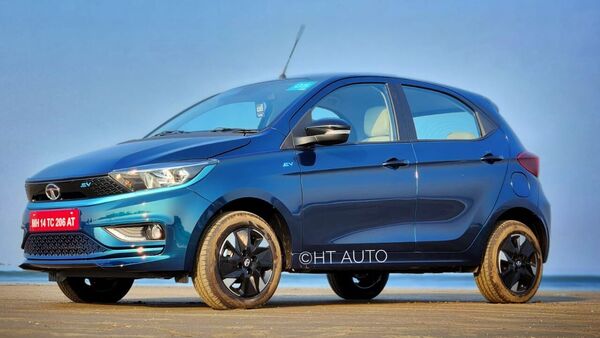
But the electric Tiago does have some of its own unique design genetics like the closed front grille in black, projector head light units, body-coloured door handles with a piano black strip, plenty of EV badges all around and hyperstyle wheels. And unlike other EVs from the Tata stable, the Tiago EV is also available in as many as five colour options - Signature Teal Blue, Daytona Grey, Tropical Mist, Pristine White and Midnight Plum.
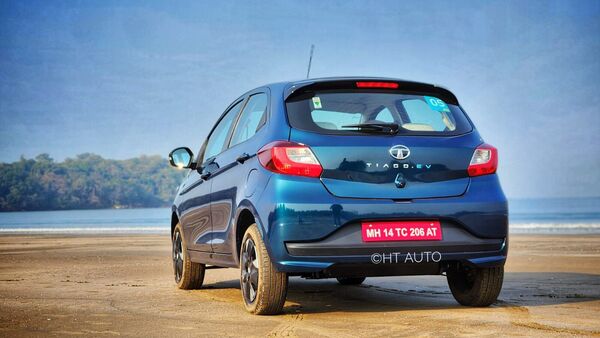
While the EV could have done with a few more uniquely cosmetic styling elements - perhaps a shark-fin antenna or a more pronounced rear spoiler, it sure still looks quite smart.
What is the Tiago EV like on the inside?
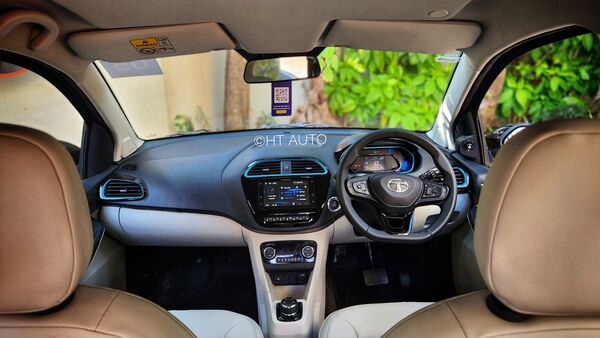
Don't keep expectations sky high as far as cabin space and comfort is concerned on the inside of Tiago EV. That said, it is quite an adequate car for a small vehicle still and because it is same in terms of dimensions as the regular Tiago, there is decent room for a family of four.
It is in terms of its feature list that the EV truly seeks to shine. Tata Motors deserves credit for ensuring certain features like automatic climate control and ZConnect telematics are standard across variants. And because this is an EV, there is automatic transmission of course.
But as one moves up the variant list, the feature list expands further. There is a two speaker plus two tweeter sound system, a 10.1-inch touchscreen - which, however, is rather dated to look and operate, a fully-digital driver display and plenty of charging options.
Among the misses though are the fact that there is no Type C charging ports anywhere here and a simple handrest next to the driver seat ought to have been an obvious addition considering this is an automatic vehicle.
What is the Tiago EV range, and its battery options?
Now here is where things get mighty interesting. Tiago EV isn't claiming to be a mile-muncher and is hardly expected to replicate what the Tigor EV, Nexon EV or the Nexon EV Max is capable of.
But while it isn't a marathon runner, it can be a nifty sprinter still. The Tiago EV comes with two battery packs - the more affordable one comes with a 19.2 kWh battery pack while there is also a 24 kWh battery pack which gives it a claimed range of around 315 kms. The real world range will depend on a number of factors but through the course of our test drive - around 100 kms, we feel the bigger battery pack would be able to last around 230 kms to 250 kms.
What is the Tiago EV like on the move?
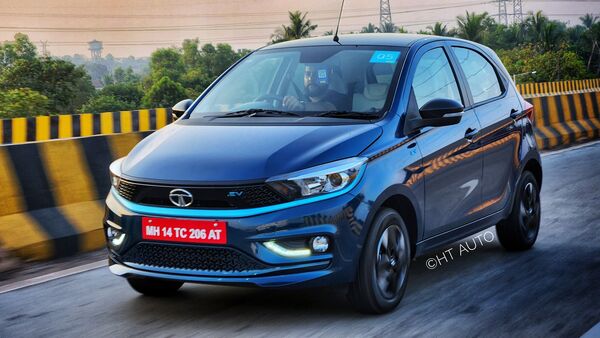
The Tiago EV drives significantly different than the Tiago but this bit was obvious. It is silent, far quicker and the automatic transmission is slick enough for the segment. There are two drive modes - City and Sport. While it is unlikely that one would use the Sport mode too often - in the interest of extracting best range, the City mode is quite a lot of fun too.
There also are three levels of regenerative braking and each setting is capable enough to add to the slowing power to send energy back to the battery, but without seeming to overpower the drive itself.
The Tiago EV goes from 0 to 60 kmph in a little over five seconds and while three-figure mark also comes up relatively quick, it isn't exactly meant to be driven at whirlwind speeds. The EV has a calm composure that becomes unsettling because of body roll and jumpy suspensions when it is being pushed too hard. Instead, the balance is rewarding within city limits where the EV does the job of providing a planted drive quite well.
Should you buy the Tiago EV?
If you have been wanting to buy an EV for the longest time but without breaking bank, the Tiago EV provides that ideal entry window. It may not grab eyeballs but the offering ensures you are not shortchanged for features either.
But if you are still rather uncertain about EVs at large, we would recommend that you wait longer still and check out the newer options that are slated for launch come 2023 - some from rivals and a few from Tata Motors too.




